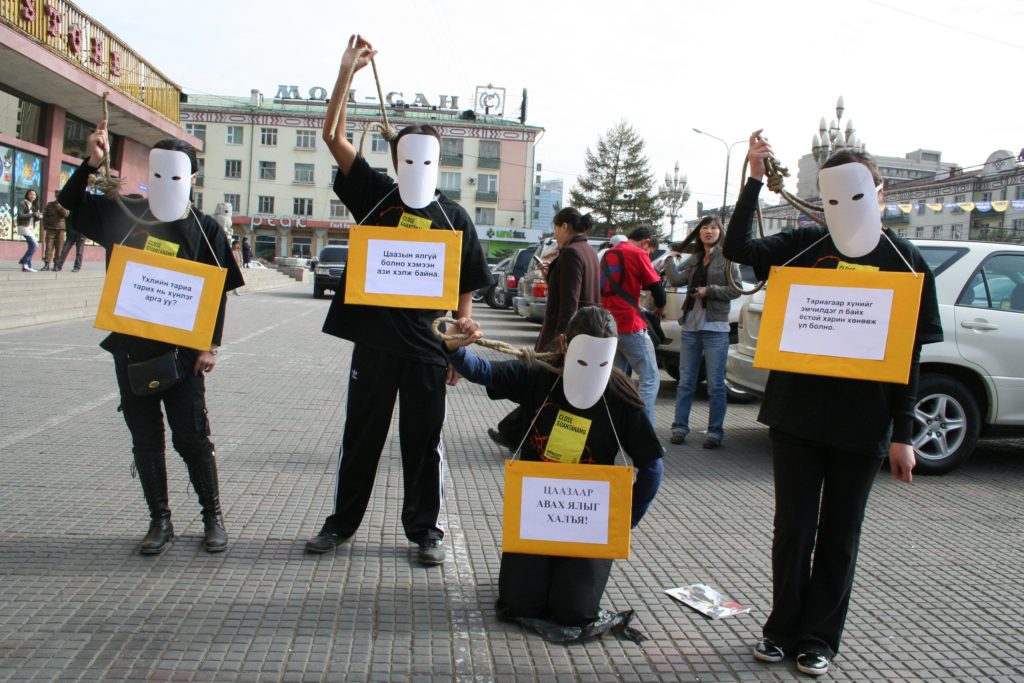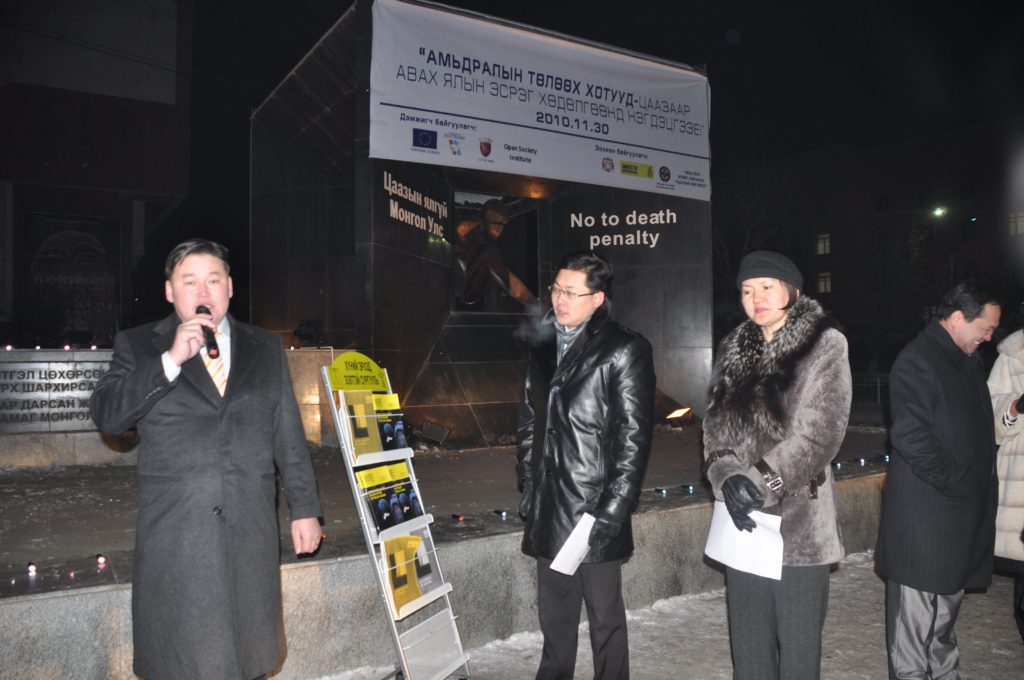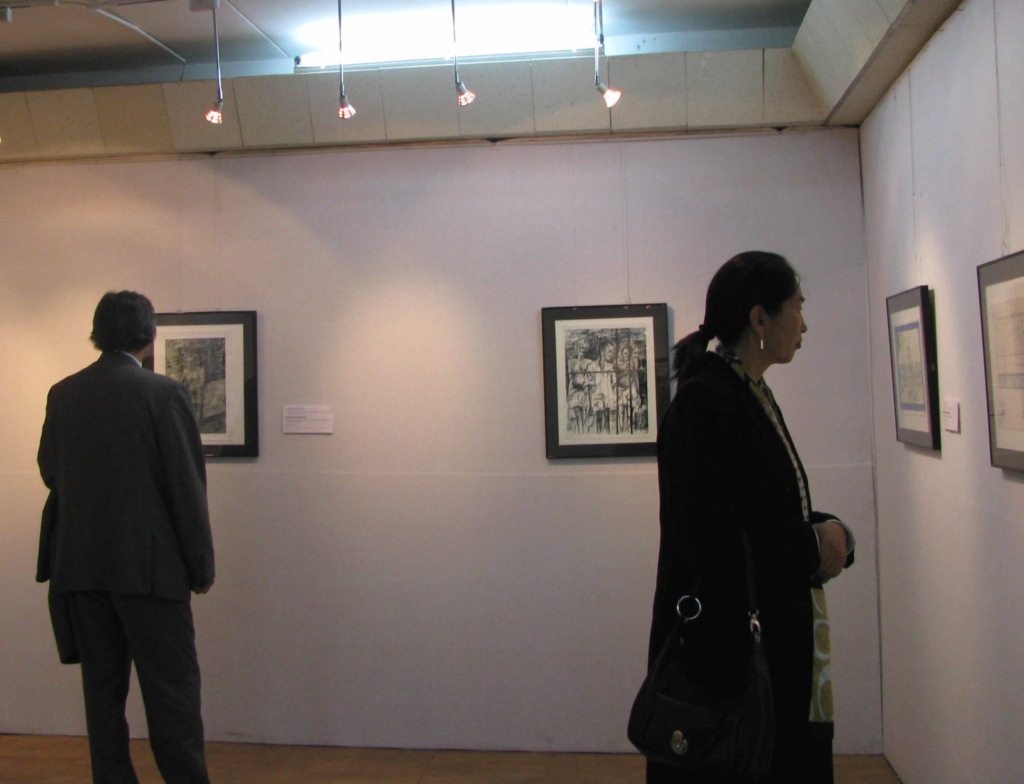Mongolia’s lawmakers have just voted in favour of a new Criminal Code that abolishes the death penalty for all crimes when it comes into effect in September next year. Amarzaya Galsanlkhagva, a long-time campaigner with Amnesty International Mongolia, looks back on the long road to victory.
Amnesty Mongolia has been campaigning to abolish the death penalty in Mongolia since our office was established in 1994, so we are all thrilled to hear this good news. While this is a victory for our supporters around the world, it also shows once again how all of us can make a real impact on human rights by working together.
It has been a long and difficult road to finally convince the Mongolian authorities to abolish this cruel, inhuman and degrading punishment. We faced many challenges along the way, but never lost hope.
A journey of peaks and troughs

Looking back on my own decade of campaigning, there were definitely times when I felt especially discouraged. Frequently, this was after some serious crime had taken place in Mongolia, and victims’ families or members of the public took to social media or other avenues to express strong support for capital punishment.
The common arguments are that the death penalty is needed to deter serious crimes, or that murderers deserve the death penalty, particularly if the victims are children. At times like these, I had a real fear that abolition was an unreachable goal in my country. Despite such discouraging moments, we kept trying.
I had a real fear that abolition was an unreachable goal in my country.
Amarzaya Galsanlkhagva
Over the years, we have explored a variety of ways to raise awareness among the public and engage the authorities in dialogue. Since 2006, every year on 10 December we’ve marked the World Day Against the Death Penalty. For the past three years we have celebrated Cities for Life Day on 30 November, to commemorate the first abolition of the death penalty by a European country in 1786.

We’ve organized art exhibitions, film discussions, given talks to law school students, gone on speaking tours with American families of murder victims who opposed the death penalty, met legislators….among many other activities, and all this must have cumulatively shifted public opinion over the years.
One event that really made a splash was our 2009 art exhibition, “On the Gallows”, marking the World Day Against the Death Penalty. It featured art by Artur Judah Angel, a former death row inmate in Nigeria whose drawings depicted death row conditions there. His art must have really struck a chord. The exhibition attracted a diversity of visitors, including state and prison officials, diplomats, law students and lawyers, the media and the general public.

Our campaign for Erdene-Ochir also left an indelible impression. He is a Mongolian who was wrongfully convicted of murder and sentenced to death in 1995. His death sentence was upheld three times by three different courts, before he was found innocent and released in 2002. His case illustrated a core concern in any argument for abolition – the risk of executing an innocent person.
A turn of the tide
Over the seven years it took for the courts to overturn Erdene-Ochir’s conviction, we witnessed the tide of public opinion turn, from support for his death sentence at the start, to the very opposite by the end. Support for the death penalty has waned further since. A survey conducted in 2011 by a research arm of the Mongolian government in collaboration with a non-profit, the Association to Protect the Right to Life, showed a majority of Mongolians thought the death penalty should be abolished as it is “irrevocable to execute innocent people”.
We witnessed the tide of public opinion turn, from support for his death sentence at the start, to the very opposite by the end.
Amarzaya Galsanlkhagva
Abolition of the death penalty in Mongolia is a historic decision and we couldn’t have achieved it ourselves. It required significant political will on the part of the Mongolian authorities to push ahead. Mongolian President Elbegdorj’s announcement in 2010 of a freeze on executions was the first positive step towards abolition in many years.
In the 1950s, Mongolia abolished the death penalty for ordinary crimes like murder but reinstated it after just 10 months in response to public demand. To prevent this from recurring, we will continue our work in Mongolia, and support campaigning in Asia and across the world to end the death penalty once and for all.


